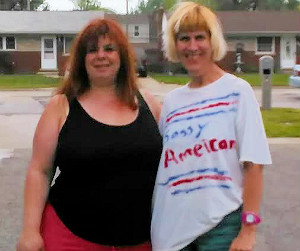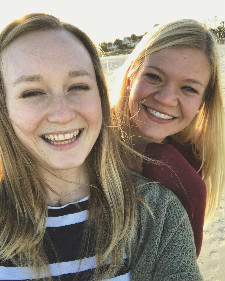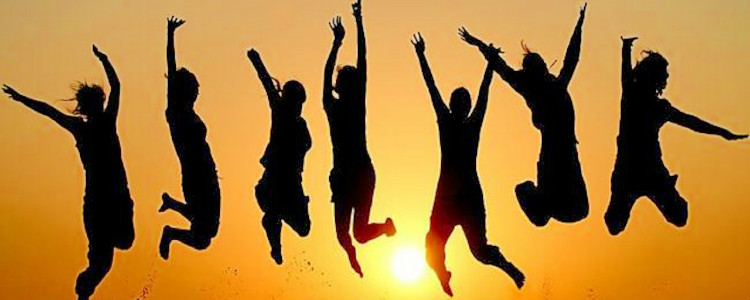To the Friends Who Kept Fighting for Us
A best friend is always there for you. They will make you laugh until you cry, support you through late nights of studying and working, motivate you to not give up, and they’ll come running to your side no matter the time of day. They allow you to let your true colors shine with no shame or judgment. A best friend is your other half; they complete you.
Today marks National Best Friends Day. It is an opportunity to reflect on our closest friends who have stood by our side throughout our hardest battles. A best friend stands by your side no matter what and fights with you. A best friend can make the journey through recovery less lonely and remind you why you chose this path to recovery. National Best Friends Day is an opportunity to recognize those guardians and reflect upon what makes them truly indispensable. Three women have shared their stories about recovery and how important it was to have their best friends by their side each and every day.
Our Recovery Contract
Katrin Alyss—What constitutes a best friend? What qualities should they bestow? Some of the attributes that come to my mind are: truthfulness, kindness, reliability, and helpfulness.
 The one person that bestows these qualities is my best friend Susan. I have known her since high school, and we now share more common interests together. She always knows what to say and how much to say without pushing her views on me. If I am having a bad day with the eating disorder, she tells me “come over and let’s talk about so we can figure it out together.” One time, when I was tempted to get some diet pills, she said, “No, you don’t want to hurt yourself by taking those pills. Talk to me about this.” She let me vent to her about the trigger and gave me a hug. When I tried to apologize for being upset, she said, “you need to get this out and tears are better than going to get diet pills.” Lately, when I was getting stressed with a class, we would go on a walk together to talk about it and it helped me avoid going to the store to get what I should not be getting.
The one person that bestows these qualities is my best friend Susan. I have known her since high school, and we now share more common interests together. She always knows what to say and how much to say without pushing her views on me. If I am having a bad day with the eating disorder, she tells me “come over and let’s talk about so we can figure it out together.” One time, when I was tempted to get some diet pills, she said, “No, you don’t want to hurt yourself by taking those pills. Talk to me about this.” She let me vent to her about the trigger and gave me a hug. When I tried to apologize for being upset, she said, “you need to get this out and tears are better than going to get diet pills.” Lately, when I was getting stressed with a class, we would go on a walk together to talk about it and it helped me avoid going to the store to get what I should not be getting.
In 2015, I made a recovery contract and Sue signed it. She said, “If you are having a hard day or feeling bad come on over and we can talk about it.” I told her I knew she was busy with other stuff. She replied, “I’m never too busy to help you out!” I also told her the feelings of guilt I had about sending someone to my therapist and it not working out because the person didn’t want to try to work with my therapist. Sue reminded me, “You tried to help out and pave the way. You can’t change other people’s actions.” She then gave the analogy of referring this friend to a restaurant and them not enjoying it and causing a scene. She said, “Whose fault would that be: yours or theirs?” I then realized what happened with that person I referred to my therapist wasn’t on me but on the person that didn’t want to try to recover. Sue always helps me makes sense of stuff by making associations or examples, to help me see things in a more realistic matter. She is a good sensible friend who doesn’t judge either.
She lets me be myself and I don’t have to put on a front with her. I am finding out that we both have a silly sense of humor. She also told me that when I am at her house, “If you’re thirsty, grab a glass and get water and if you want an apple, help yourself.” She is a very nice and generous person. She is a great person who I am honored to call my best friend!
The Power of Female Friendships
Claire Trainor—When I think of the way my friends have supported me through my recovery, I realize that there are three very distinct groups that people fall into: friends I knew before I got sick who have stayed by my side through my recovery, friends I met in treatment who supported me through the worst of it, and friends who have never known me while I was sick but continue to make me feel empowered and loved every day.
Some of my best friends knew me for years before I got sick, some only for weeks. Regardless, these people had an understanding of who I was before my eating disorder started; they saw what my old teacher used to call my sparkle, before the depression, anxiety, and behaviors made me dull and took away that shine. Throughout being sick, they were the ones who reminded me of what had been there before. They showed me that I was a person worth loving. No matter what I did, no matter how sick I got, no matter how distant I was, they were the people who stayed to support and love me. From them, I learned that I’m a person who is worth fighting for, even when it gets hard. I learned that there will be people who stick by me, even when I’m not the person I want to be. I learned that I’m worth struggle and difficulty.
The girls I met in treatment, many of whom became my best friends, are some of the most encouraging people I know. When those who knew me before couldn’t understand my disorder, the way my mind worked, my treatment friends stepped in to tell me I wasn’t alone. They were the the women who sat with me through countless meals, who made me laugh when we spent holidays away from our families, who snuck movies on our laptops when we were supposed to be studying. They were the ones who helped me to remember what normalcy felt like, to rediscover the silliness and joy of being a 17-year-old girl. There was something so raw and intimate about those friendships, a certain vulnerability that emerged as a result of being in treatment together. We were able to be silly, to cry, to be angry without any hesitation or guilt or fear, because we were all each other had during those months. Post-treatment, they’ve become the people I lean on when normal life gets hard, too, even if it has nothing to do with recovery. They helped me rediscover the beauty of being vulnerable and raw with friends and I thank them every day.
And the friends I have met after, beautiful, strong, capable women, inspire me daily. They remind me of the power and strength of female friendships. They remind me that there was always more to me than what my eating disorder saw. They support the choices I make, they call me out when they’re worried. Their support in my recovery has been indirect and subtle; no longer am I in a place where I need someone to sit with me while I eat meals (although they would if I asked); instead, their support comes in the constant reminder that I am loved. I am so lucky to be surrounded by such powerful women, women who remind me of my own strength and brilliance and potential, who inspire me to be better daily. Their support comes in their constant belief in me, in their encouragement and light and knowing that if I’m loved by such amazing women, I must be amazing, too.
Out of the Darkness
Stephanie Virbitsky—Since eating disorders thrive in isolation and darkness, it is essential for recovery to take place in conjunction with community. My friends have been the community essential to my recovery in so many marvelous ways. I’ll talk about some of the ways friends have helped my recovery through three areas of life that needed healing from the damage of my eating disorder.
 First is my relationship with food. During my darkest hour, I was unable to show up in social settings due to my anxiety around food. This led me to avoid these situations altogether, which made me feel even more lonely, isolated, and depressed. In a tremendous act of love and patience, my friends have helped me to understand and re-learn how average college students interact with food. Simply being able to be in a social setting with friends who know where I’m coming from and can talk through the many confusing thoughts and feelings that still linger from my eating disorder has been incredibly helpful in my recovery. Today I can march into social settings with confidence. Other days, I’m an anxious mess. On both kinds of days, I know that I have friends to laugh and cry alongside me.
First is my relationship with food. During my darkest hour, I was unable to show up in social settings due to my anxiety around food. This led me to avoid these situations altogether, which made me feel even more lonely, isolated, and depressed. In a tremendous act of love and patience, my friends have helped me to understand and re-learn how average college students interact with food. Simply being able to be in a social setting with friends who know where I’m coming from and can talk through the many confusing thoughts and feelings that still linger from my eating disorder has been incredibly helpful in my recovery. Today I can march into social settings with confidence. Other days, I’m an anxious mess. On both kinds of days, I know that I have friends to laugh and cry alongside me.
My eating disorder developed while I rooted much of my identity in my running career. When I chose recovery, I chose to listen to my treatment team and halt all forms of intense exercise (including running) altogether. About two years later, I decided I was ready to try running again because I missed the feeling of flying, the adventure of the trails, and the camaraderie of the sport. This was a confusing and emotional exercise more than a physically difficult one. Without dedicated and knowledgeable running buddies and friends that could help me process through the emotional and physical struggles of getting back to running, I would either have given up on trying to reestablish a healthy relationship with running or would have compromised my recovery. Again, whether I’m having a good or bad day in my relationship with running, I know who I can call to laugh, cry, and sweat with.
Though food and running relationships were essential to my healing, perhaps the most important was understanding where my worth and foundation of truth came from. Eating disorders, depression, and anxiety all attack us at the core of our being, whispering of our unworthiness and need to control every aspect of life in our ears. They twist reality, paralyzing many sufferers with fear.
As a Christian, I acknowledge that there is a defined external truth in this world (which I attribute to the Hebrew God and Jesus), rather than a personally defined set of truths within each individual. It was and is essential for me to root myself in these beliefs (that God is truth and love, He created beautiful things, and He loves the people He created so much that He wants to know us and be involved in our lives here) so that I can stand up to and test the words of my anxiety, depression and eating disorder. The friends that came alongside me to teach, challenge, remind, and help me to integrate these beliefs in my recovery have truly helped me to address the very foundation of being that my eating disorder seeks to fracture.
All in all, on this day, National Best Friends Day, I am reminded of just how incredible my friends are and how indispensable they have been in my recovery and my life. Without them, I don’t like to think of what would or could have happened to me during my worst days. With them, I am humbled and filled with extreme gratitude. Thank you for meeting me where I am and walking with me through the valleys and mountains of life.




